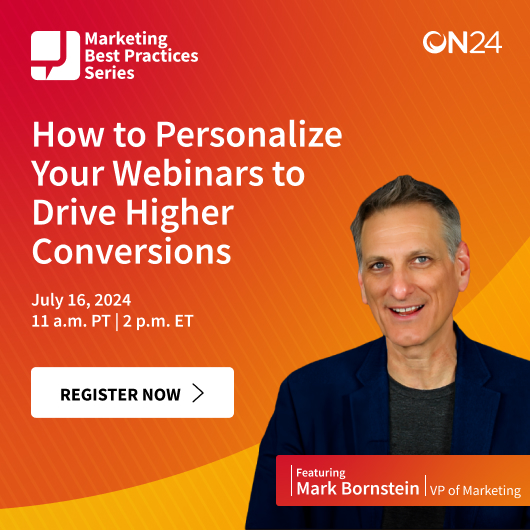Driving Personalization Success in the AI Era for B2B Marketers

Every B2B marketer knows they have to capture the attention of their audience. But that task is made difficult thanks to today’s hyper-competitive digital landscape. The onset of generative AI could make things even more difficult as competitors use these tools to flood the market with generic content.
How can you stand out? First, you make your content the best. Second, you scale that amazing quality material with — you guessed it — generative AI. That’s because, used well, these tools offer organizations the ability to enhance personalization, streamline content production and connect with target audiences more effectively.
Discover how marketers can use AI to drive personalization success and provide actionable insights so you can scale quality and results.
Personalization Made Attainable with AI

B2B marketers know AI has the potential to make personalization at scale attainable. In fact, according to the ON24 2024 Digital Engagement Benchmarks Report, 88% of marketers believe that AI can enhance personalization. This belief is grounded in tangible benefits:
- Increased Conversion Rates: Personalized experiences have been shown to double conversion rates for meetings booked.
- Enhanced Engagement: Calls-to-action in personalized content see a 68% higher engagement rate compared to generalized content.
- Higher Demo Requests: Personalized experiences yield nearly four times more demo requests than non-personalized interactions.
The underlying reason is straightforward: buyers respond more positively to relevant marketing tailored to their needs. According to Forrester research, two-thirds of B2B buyers expect the same level of personalization in their professional lives as they do in their personal lives.
How Generative AI Supports Personalization
Okay, so we know that B2B audiences want personalization. But how does generative AI help marketers make it happen? And, how can a generative AI marketing strategy create and deliver personalized offers while bearing in mind the complexity and length of the B2B buying journey? Simple, with three core pillars:
- Scaling Personalization Efforts: AI can analyze vast amounts of data to create personalized content at scale, something that would be impractical manually.
- Enhancing Data Utilization: AI can process first-party data to deliver highly relevant and timely personalized experiences.
- Improving Accuracy: By leveraging AI, marketers can ensure that personalization efforts are accurate and effective, avoiding the pitfalls of bad personalization.
Moreover, AI can help identify patterns and preferences in customer behavior that might not be immediately apparent. This allows for deeper personalization, such as tailoring content based on a prospect’s previous interactions with your brand, their industry or specific pain points they have expressed.
AI Raises Expectations

While many marketers are optimistic about AI’s potential, those currently using AI report significantly higher expectations for its benefits:
- Elevating Marketing Channels: 68% of AI users believe it will elevate existing channels.
- Optimizing New Channels: 64% expect AI to optimize new marketing channels.
- Improving Engagement: 59% foresee better engagement through AI-driven personalization.
- Accelerating Deal Closures: 54% believe AI will help close deals faster.
These benefits are particularly pronounced in areas like email marketing, where personalized content can significantly increase open and click-through rates. AI can also enhance account-based marketing (ABM) strategies by providing deeper insights into target accounts and personalizing outreach efforts accordingly.
Majority of B2B Marketers Plan to Use AI for Personalization

Given the clear benefits, it’s no surprise that nearly 90% of B2B marketers, according to ON24 research, plan to use AI for personalization. However, perceptions of AI’s potential vary significantly based on current usage:
- Optimistic Users: Those already using AI are more likely to believe in its ability to enhance personalization and drive business outcomes.
- Skeptical Non-Users: Marketers not yet using AI are less convinced of its potential benefits.
Regardless of whether you’re skeptical or optimistic, you’ll need to understand how to effectually take advantage of AI. Here’s what to consider when you first start implementing an AI strategy:
Steps to Successful AI-Powered Personalization
- Start Small: Test AI tools on a smaller scale to understand their capabilities and limitations. For example, you might start by using AI to personalize email subject lines or segment audiences for targeted campaigns.
- Focus on High-Value Areas: Begin personalization efforts where the potential impact on the pipeline is greatest. This could be high-value accounts or key stages in the buying process where personalized interactions can make the biggest difference.
- Ensure Accuracy: Only personalize to the extent that you are confident in the data’s accuracy to avoid negative impacts. Inaccurate personalization can do more harm than good, potentially alienating prospects.
- Review AI-Generated Content: Always have a human review AI-generated content before publication to ensure quality. AI can generate content quickly, but it may lack the nuance and context that a human editor can provide.
ON24 Tip: Personalize Existing Content
Personalizing offers and calls-to-action within existing events and on-demand content can yield substantial benefits without the need for extensive rework. For instance, personalized webinar invites can significantly boost attendance and engagement. Consider incorporating personalized recommendations and follow-up actions based on attendee behavior during webinars.
Untapped Opportunity in First-Party Data

Despite the need for hyper-targeted messaging, many B2B marketers don’t strategically use the one asset that would most help them in their personalization journey: first-party data. In fact, according to ON24 research, only 30% of marketers personalize by buying stage and fewer marketers personalize based on content-level or account-level engagement history.
It’s time to change that. But before you can start, you need to implement a three-prong strategy for your first-party data. Here’s what you need to keep in mind:
Leveraging First-Party Data for Better Personalization
- Improve Data Quality: Ensure data collected is accurate and structured consistently across platforms. This involves regular audits and updates to data records to maintain their relevance and accuracy.
- Use Various Data Types: Incorporate demographic, firmographic, technographic, third-party intent, first-party account intent, and engagement data. Each data type provides a different layer of insight, contributing to a more comprehensive understanding of your audience.
- Integrate Across Tools: Seamless integration across different tools and platforms will enhance AI’s ability to deliver effective personalization. This might involve integrating your CRM, marketing automation, and analytics platforms to ensure data flows smoothly between them.
ON24 Tip: Better Data Quality, Quantity and Structure
As with any data, you need to understand the inputs that power insights. Some of the top sources that B2B marketers use include demographic, firmographic, technographic, third-party intent, first-party account intent and engagement data from digital events like webinars.
Regardless of where you source your data, make sure it’s collected, accurate, structured, and mapped consistently across platforms and tools. This will help you get the most out of both AI-powered and traditional technology solutions and achieve the best possible results from personalization.
Key Actions for B2B Marketers in the AI Era

To make the most of AI-driven personalization, B2B marketers should:
- Invest in Data Infrastructure: Build robust data infrastructure to support AI and personalization efforts. This includes investing in data management platforms (DMPs) and customer data platforms (CDPs) that can handle large volumes of data and provide real-time insights.
- Train Teams on AI Tools: Equip your marketing team with the skills needed to leverage AI effectively. This might involve training sessions, workshops or partnering with AI vendors for hands-on guidance.
- Continuously Monitor and Optimize: Regularly review and refine personalization strategies based on performance data. Use A/B testing and other analytical methods to determine what works best and adjust your approach accordingly.
- Engage Executives: Secure executive buy-in by demonstrating AI’s potential through pilot projects and tangible results. Showcasing quick wins can help garner the support needed for larger AI initiatives.
AI-Powered Personalization in Action

Consider the example of a B2B software company that used AI to personalize its email marketing campaigns. By analyzing engagement data and past interactions, the company was able to segment its audience more effectively and tailor its messaging to different buyer personas. As a result, they saw a 25% increase in email open rates and a 30% increase in click-through rates, leading to higher lead generation and improved sales outcomes.
As B2B marketing enters the AI era, leveraging AI for personalization is not just a trend but a necessity to stay competitive. By harnessing the power of generative AI, marketers can deliver personalized experiences at scale, improving engagement, conversion rates, and overall business outcomes.
Ready to dive deeper into AI-driven personalization? Check out how the ON24 Intelligent Engagement Platform helps you scale personalization with the AI-powered Analytics and Content Engine.
